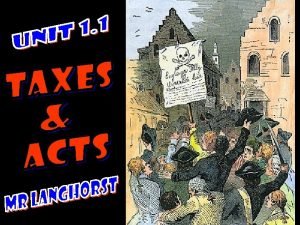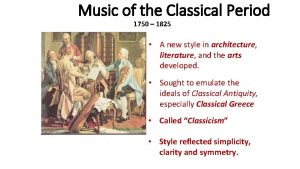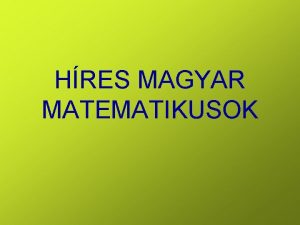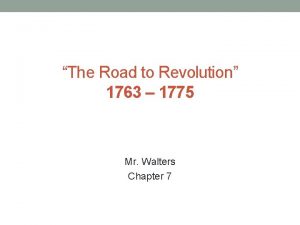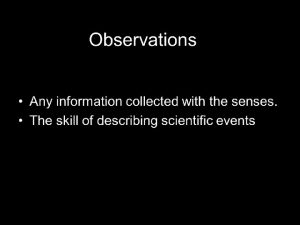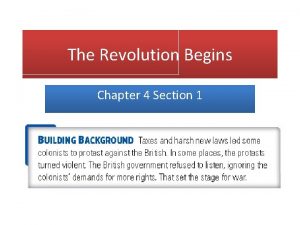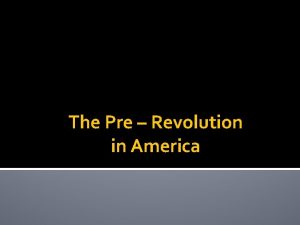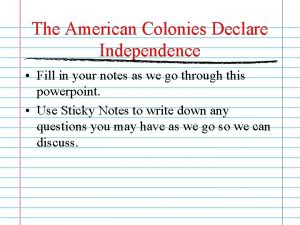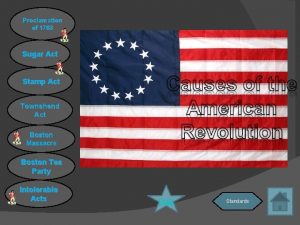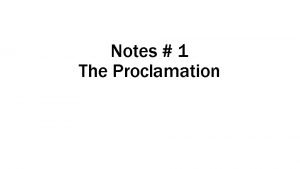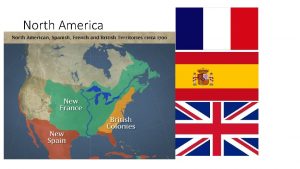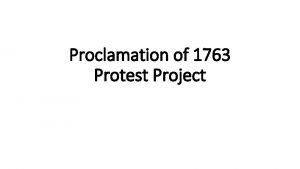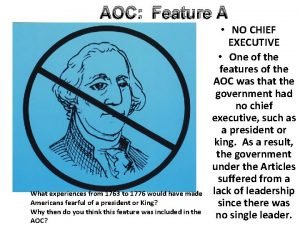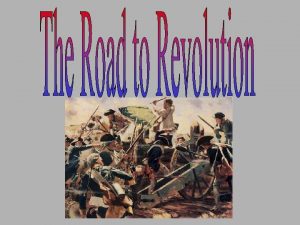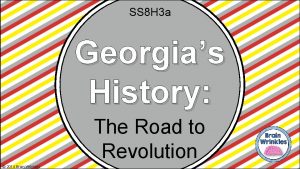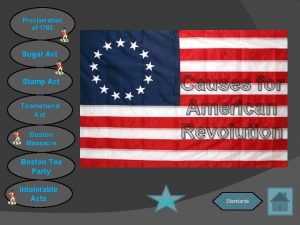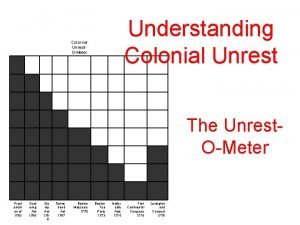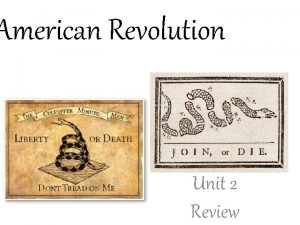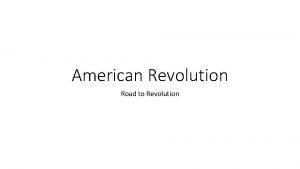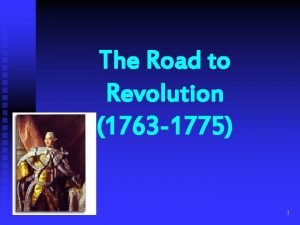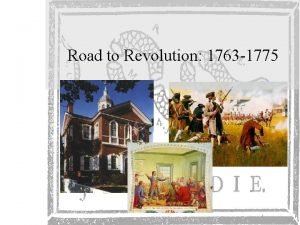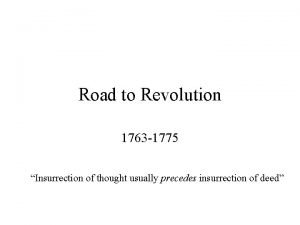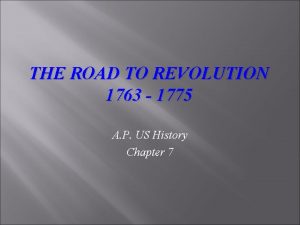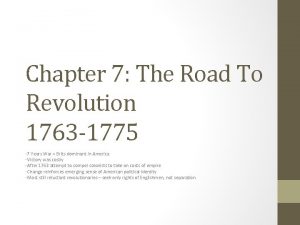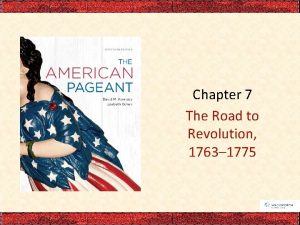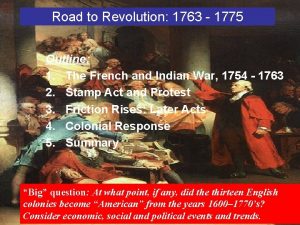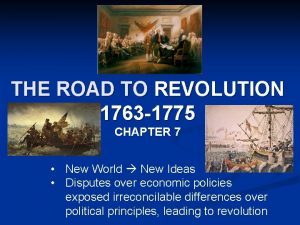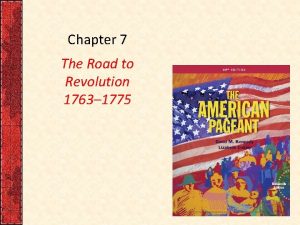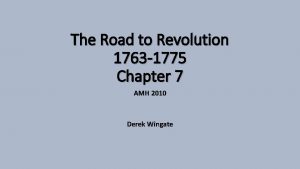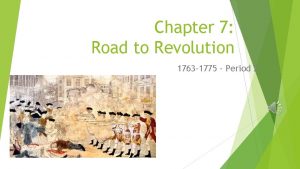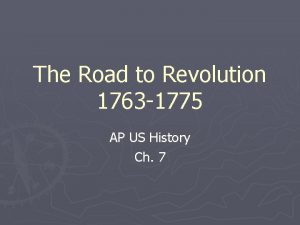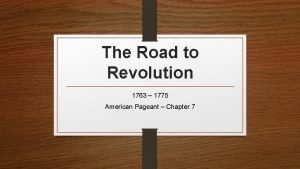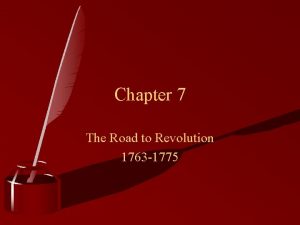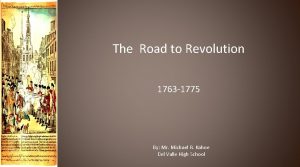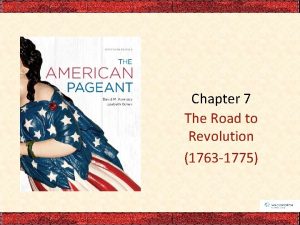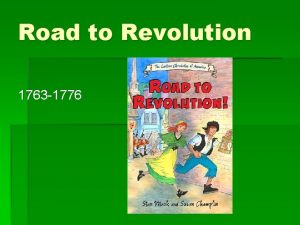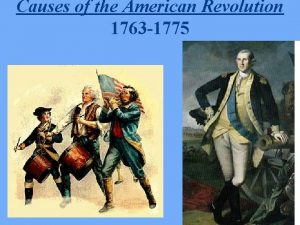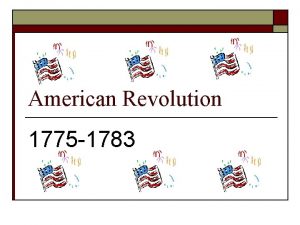The Road to Revolution 1763 1775 How did


























- Slides: 26

The Road to Revolution 1763 -1775

How did England “rethink” Empire? England had 2 problems: 1) Governing and protecting the colonies 2) Paying for massive debts incurred from wars F&IW Debt = $140 million pounds England decided to enforce existing taxes on the colonists to cover the cost of troops in America.

Acts that Angered! 1) Proclamation of 1763 2) Sugar Act - 1764 Lowers tax on molasses 6 p to 3 p taxed including sugar, certain wines, coffee, pimiento, cambric and printed calico, and further, regulated the export of lumber and iron -duties would be strictly enforced -reduced rum trade immediately -reduced markets colonies could sell to Mastermind George Grenville (note : Remember the law existed but had been ignored; SN!)

Currency Act - 1764 Colonial currency as a mess Different currencies existed for different functions England assumed control prohibiting issue of any new currency Would be based on British pound sterling abolishing colonial money Also: Persons guilty of smuggling or other customs violation would receive a trial favorable to British interests (Custom officials received a portion of smuggled goods as “payment” to enforce the laws)

The Stamp Act - 1765 • A tax placed on every piece of printed paper used in the colonies -legal documents, licenses, newspapers, ship’s papers, playing cards Used to pay the cost of British troops defending the frontier (App. Mtns. ) Issue: Colonists were not upset about the cost! Past taxes had been measures to regulate commerce, not raise money! The Act was constituted without the approval of colonial legislatures If these taxes were allowed to stand, the door opened for more troublesome taxation in the future!

Theories of Representation Q-> What was the extent of Parliament’s authority over the colonies? ? ABSOLUTE? or LIMITED? Q-> How could the colonies give or withhold consent for parliamentary legislation when they did not have representation in that body? ?

The Stamp Act Crisis The Loyal Nine - shopkeepers and artisans join together against the Stamp Act -attempted to lead public to drive stamp distributors from Boston -first step towards political organization in the colonies The Sons of Liberty (Sons of Violence - Sons of Iniquity) Rebellious stripes flag Attacked symbols of British Authority “No taxation without representation!” Leaders included Paul Revere, Patrick Henry, John Hancock, John Lamb, John Adams, Silas Downer, and Samuel Adams

The Stamp Act Congress - 1765 • An inter-colonial meeting to plan resistance to the tax 9 colonies attended Approved the 14 point Declaration of Rights and Grievances -taxation could only be carried out by colonial assemblies SOL called for a non-importation agreement against English products

Quartering Act 1765 • Great Britain would quarter troops in American Barracks and public houses • If soldiers outnumbered housing: - would be put in any available housing - citizens would provide food and drink with no compensation 1766: New York failed to honor the Act Parliament suspended New York’s provincial government until they allocated funds (1771)

The Declaratory Act - 1766 An act of Parliament to regulate the behavior of the colonies It repealed the Stamp Act Why? 1. English economy was suffering 2. Colonial protests 3. Grenville had been replaced & 4. Benjamin Franklin convinced Parliament the colonies opposed internal taxes (Stamp Act) but not external taxes (duties) The Act essentially stated England had the right to levy taxes and make laws for the Colonies!

Because the Stamp Act had been repealed, no one was angered over the Declaratory Acts, until…. 1) 2) 3) 4) The Townshend Acts - 1767 The Suspending Act- Suspended NY assembly until it complied with the Quartering Act of 1765 The Revenue Act - taxes on lead, paper, glass and tea Created a board of Customs Commissions to regulate ports and collect import taxes Allowed British tea to be imported to the colonies duty free It also created 3 new British courts in America designed to try colonists under British laws

The colonists responded negatively • 1768 - Letters from a Farmer in PA - John Dickinson (aroused violent opposition to TA) • Rise of the Daughters of Liberty • Riots against custom officials • The Liberty 4000 British soldiers sent from NY to Boston to stop the riots

March 5, 1770 Boiling temperatures erupted! Taunting colonists threw snowballs, church bells rang out, and the lashing out of a British soldier turned into… The Boston Massacre Several shots rang out into the night and five colonists lay dead The soldiers would be tried for murder and were acquitted Their lawyer - John Adams

Are the accounts accurate? ? Paul Revere’s print John Bufford’s 1830 print Other problems, but more realistic Where’s Crispus Attucks

Newspaper account of the Massacre 3 men died at the scene 2 died later

June 9, 1772 The Gaspée Affair • • Patrolling British custom ship runs aground - near Providence RI A group of men board the ship and set it on fire • A reward was offered No one ever came forward - no one was arrested The British planned to try the guilty in England under treason This was upsetting to colonial governments

The Committees of Correspondence • Spearheaded by Samuel Adams • 1772 - Organized in Boston • Against Crown’s decision to pay salaries of royal governors • 1773 - Virginia House of Burgess called for permanent committees to be formed- a sign the problems were getting worse • Purpose - to warn neighboring colonies about incidents with BR.

The Tea Act 1773 • Permitted East India Co. to sell directly to colonies w/o middlemen (cheaper tea but with a tax) • Expected colonies to choose the cheaper tea over concern of paying taxes! Boy were they wrong!! - strong opposition to the new tea shipments in Boston and other colonial ports

The Boston Tea Party 1773

The Coercive or Intolerable Acts-1774 • Direct response to Boston Tea Party • Boston Port Act - closed the port until the cost of tea was repaid • Mass. Government Act - all positions in Mass were to be appointed by King - disallowed town meetings • Administration of Justice - move royal official trials out of Mass to England or another colony “The Murder Act” • The Quartering Act of 1774 -British soldiers could be housed in unused buildings (least objectionable)

The Quebec Act -1774 • Unrelated to Boston • Enlarged the boundaries of Quebec to control non-colonial lands • Colonists believed the French were being courted to oppress the colonies.

First Continental Congress (1774) • 55 delegates from 12 colonies • Agenda How to respond to the Coercive Acts and the Quebec Act? 1 vote per colony represented -adopted a total boycott of Br goods A Dec of Rights and Grievances directly to King George III Would meet the next year if their complaints had not been addressed

1775 - The Spark of Revolution • April 1775 - MA colonists began collecting military supplies at Concord, MA • British troops were assembled to go to Concord to destroy the caché of weapons • April 18, 1775 Paul Revere Rides!!

The REGULARS are Coming! • Revere would never say the British were coming • One if by Land; Two if by Sea • Three men actually make the ride • Revere never finishes his leg • William Dawes • Dr. Samuel Prescott • They rode the countryside warning the colonial militia

William Dawes Dr. Prescott

April 19, 1775 • 700 British troops arrive at Lexington • 75 militia men are waiting • “minutemen” • Continued to Concord • Thousands of militia turn out and force the retreat of the British back to Boston • 300 BR dead, < 100 militia The Shot Heard ‘Round the World The American Revolution had begun
 What did the proclamation of 1763 forbid
What did the proclamation of 1763 forbid Why did the colonists hate the proclamation of 1763
Why did the colonists hate the proclamation of 1763 Could the french revolution have been avoided
Could the french revolution have been avoided Classical period 1750 to 1820 romantic period
Classical period 1750 to 1820 romantic period Magyar matematikusok
Magyar matematikusok 1775-mr4
1775-mr4 Battle of lexington and concord winner
Battle of lexington and concord winner Valentin ross forensic science
Valentin ross forensic science Chapter 4 section 1 the revolution begins
Chapter 4 section 1 the revolution begins May 1775
May 1775 What is the significance of july 4 1776 brainpop
What is the significance of july 4 1776 brainpop May 1775
May 1775 What is paved and unpaved road
What is paved and unpaved road Proclamation of 1763 picture
Proclamation of 1763 picture Proclamation of 1763
Proclamation of 1763 The albany plan of union
The albany plan of union Ohio river valley 1763
Ohio river valley 1763 Proclamation of 1763 protest poster
Proclamation of 1763 protest poster What experiences from 1763 to 1776
What experiences from 1763 to 1776 Proclamation of 1763
Proclamation of 1763 Proclamation of 1763 caricatures
Proclamation of 1763 caricatures Proclamation of 1763
Proclamation of 1763 First nations attack fort michilimackinac
First nations attack fort michilimackinac Thomas barnard sermon massachusetts 1763
Thomas barnard sermon massachusetts 1763 Proclamation of 1763
Proclamation of 1763 Quartering act definition
Quartering act definition Proclamation of 1763
Proclamation of 1763

